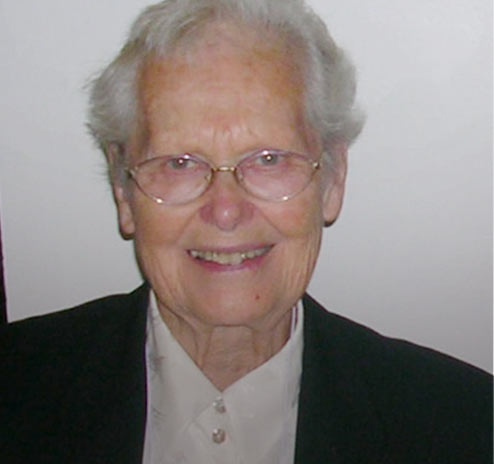Board of Reference
Dr. Mary Berry

Mary Berry, CBE, Musicologist and Augustinian Canoness
Born Cambridge, England – June 29, 1917
Died Barton, England – May 1, 2008 (The Feast of the Ascension of Our Lord)
Mary Berry, CBE was born into the extraordinary academic and musical world of Cambridge, England in 1917. Dr. Berry was educated at the Perse School in Cambridge, and during her “gap” year (the year before university) she traveled to France to study music. This proved one of the greatest turning points in Dr. Berry’s life: her year of study with Nadia Boulanger. As Dr. Berry once recounted:
I was half-way up the grand staircase of the École Normale de Musique in Paris. I was approached by a rather striking and imposing lady. “Are you looking for somebody?” asked the gaunt figure. “Yes, I’m trying to find someone to teach me Harmony and Counterpoint and Fugue.” “Come round this evening to No. 36, rue Ballu, at 6 pm.” I went.
This was her first encounter with Nadia Boulanger. Their friendship, always an inspiration to Dr.Berry, continued until Nadia’s death October 22, 1979.
Dr. Berry’s accomplishments as a musicologist were far-reaching and groundbreaking. Her doctoral dissertation, The Performance of Plainsong in the Later Middle Ages and the Sixteenth Century (supervised by Thurston Dart), was the first work of its scope and launched her career. She was appointed Director of Music Studies at Girton College, Cambridge, and was awarded a Research Fellowship at Newnham College, Cambridge.
During World War II, Dr. Berry joined the British Red Cross as a Nurse. Then in March of 1940, she joined the noviciate of the Canonesses Regular of St. Augustine in Belgium, and spent the war years racing across Europe from Lisbon to Brussels, nursing and teaching. Dr. Berry, who was also known by her religious name Mother Thomas More, founded the Schola Gregoriana at Newnham College in 1975, for the study, teaching and performance of Gregorian chant.
Dr. Berry was highly influential in the development of Gregorian chant in the United States, and particularly with Gloriae Dei Cantores on Cape Cod, Massachusetts. She infused the choir with her love of Gregorian chant. She gave herself through many teaching sessions with both adults and children, based on her belief that anyone was capable of singing chant, and thereby receiving the inspiration of the Holy Spirit. When Gloriae Dei Cantores first toured in England, the relationship with Dr. Berry deepened. A small group of choir members, later known as the Schola, went to her home in Cambridge every afternoon, where she passed on her love and knowledge of chant. Schola members returned to study with Dr. Berry in subsequent years, right up to her passing in May 2008. She expected perfection in the chant, and her zeal inspired her pupils to give nothing less. Since then, the Schola has become an ambassador of sorts, endeavoring to carry on Dr. Berry’s mission.
Dr. Berry traveled widely, conducting singing weekends, Holy Week courses, Summer Schools, Singing Pilgrimages, and master classes, and she lectured throughout the United Kingdom, Europe, Estonia and Latvia, Australia, the USA and Canada, and the Caribbean. She continued her research into the evolution of different styles of performance practice from the tenth to the twenty-first centuries and made a series of recordings with the Schola Gregoriana in the UK and Europe, and the Gloriae Dei Cantores Schola in the USA.
Dr. Berry was a regular reviewer for Gramophone, which became as lively as passion for her as conducting and performing. She wrote two instructional books on Gregorian chant, and contributed numerous articles to the New Grove’s Dictionary of Music and Musicians. In 2000, Dr. Berry was award the Cross, Pro Ecclesia et Pontifice, by Pope John Paul II. Then in 2002, she was awarded Commander of the British Empire by Queen Elizabeth II for her contribution to Gregorian chant.
← Back to Board of Reference
